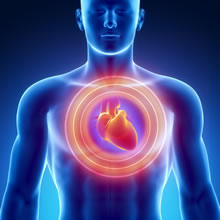
The most severe type of heart attack is known as STEMI (ST-elevation myocardial infarction), in which blood flow is completely blocked to a part of the heart.
Emory University Hospital (EUH) and Emory University Hospital Midtown (EUHM) have received the American Heart Association's (AHA) Mission: Lifeline® Heart Attack Receiving Center Accreditation.
Sponsored by the AHA and the Society of Cardiovascular Patient Care (SCPC), the Mission: Lifeline® accreditation program recognizes hospitals that quickly and appropriately treat the most severe type of heart attack known as STEMI (ST-elevation myocardial infarction), in which blood flow is completely blocked to a part of the heart.
According to the AHA, hundreds of thousands of Americans experience STEMI heart attacks each year and the majority of these patients fail to receive appropriate treatment for their life-threatening conditions within recommended timeframes.
"Our goal is to get patients to the right place in the shortest amount of time to get treatment," says Michael Ross, MD, professor of emergency medicine at Emory and co-chair of the Atlanta Mission: Lifeline Program.
"We believe that starting this process in the field, upon first medical contact, helps us to minimize the severity of the heart attack. Then we can prepare for the patient's arrival by quickly activating and preparing the cath lab to unblock the artery and save as much heart muscle as possible."
Treatment options for a STEMI consist of percutaneous coronary intervention, which includes both angioplasty and stenting; clot-busting medication; and coronary artery bypass graft surgery.
Both Emory hospitals underwent numerous on-site reviews by accreditation specialists from the SCPC. To receive accreditation, they both demonstrated exceptional quality of care for STEMI patients presenting via four different routes: 1) via EMS (emergency medical services) for patients who called 911 from the field and came directly to the hospitals; 2) patients who walked in directly to the hospitals' emergency departments without calling 911; 3) patients transferred from a different hospital to Emory after a STEMI was diagnosed at the first location; and 4) patients who developed their STEMI while already an inpatient in one of the Emory hospitals.
In addition, both hospitals demonstrated exceptional quality of care for STEMI patients throughout their hospital stay, including in the emergency department, cardiac catheterization laboratory, cardiac intensive care units, and hospital wards through hospital discharge.
"This accreditation is a tremendous honor for our cardiac care program and a testimony to our teamwork and commitment to using the latest scientific research to provide our patients with lifesaving, quality care," says Abhinav Goyal, MD, MHS, associate professor of medicine (cardiology), Emory University School of Medicine, and director of quality for cardiology at EUH and EUHM. Goyal also serves as co-chair of the Atlanta Mission: Lifeline Data Quality Subcommittee.
Last year, EUH and EUHM, along with Emory Johns Creek Hospital (EJCH) and Saint Joseph's Hospital, as well as affiliated Southern Regional Medical Center, all received the AHA Mission: Lifeline Bronze Recognition award for achieving high standards in STEMI heart attack care for 2012.
Goyal and Anwar Osborne, MD, assistant professor of emergency medicine, Emory University School of Medicine worked together to prepare Emory's applications for the AHA accreditation.
For more information on the American Heart Association Mission: Lifeline® Heart Attack Receiving Center Accreditation, visit www.heart.org/missionlifeline or www.scpcp.org.
